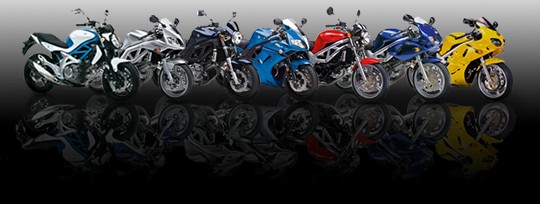 |
 |
| Bikes - Talk & Issues Newsworthy and topical general biking and bike related issues. No crapola! Need Help: Try Searching before posting |
 |
|
|
Thread Tools |
|
|
#21 | |
|
Noisy Git
Mega Poster
Join Date: Apr 2007
Location: Halifax/Leeds
Posts: 26,645
|
Quote:
To be fair, the values given probably aren't aimed at being precise guides to tightening things after 20 years, 50 tensioning cycles, a gallon of plusgas and loosening with a 5lb hammer either. My general practice, if torquing with slippy stuff there, -10% on torque rating. If using loctite... no adjustment.
__________________
Currently Ex Biker
Now rebuilding a 63' fishing trawler as a dive boat |
|
|
|

|
|
|
#22 |
|
Guest
Posts: n/a
|
I can hardly think of any nuts an bolts that would go through that many tightening cycles in a SV650's life time even on a 3000 mile maintenance routine
We have enough trouble on lorry wheel nuts/studs due to stretch considering they are a much higher spec steel and we only keep the trucks for 5 years and they are torqued after each 6 weekly maintenance schedule |

|
|
|
#23 | |
|
Noisy Git
Mega Poster
Join Date: Apr 2007
Location: Halifax/Leeds
Posts: 26,645
|
Quote:
My bike, 105,000 miles. Chain check every what 1500 miles?* There's 70 on the wheel spindle threads... a part you're unlikely to replace as glibly as a normal nut and bolt and a part that you're more likely to wave a torque wrench at. The manual is looking at a shiny new bolt from a parts bin going into a freshly tapped and degreased hole. You are looking at a 15 year old blob of rust and abuse which may or may not have the same thread form and frictional properties. Much higher spec steel? Than what? What grade and heat treat? What about comparing it like-for-like with the specific bike part you're on about? Lorry wheel studs are massive, and they don't particularly care about weight. What about the hollow, thin walled aluminium the GSXR front spindles are made of? Which is the high grade part there? *No chance on mine, it has a scottoiler and a healthy does of ignorance-is-bliss attitude to it's tension.
__________________
Currently Ex Biker
Now rebuilding a 63' fishing trawler as a dive boat |
|
|
|

|
|
|
#24 |
|
Member
Mega Poster
Join Date: Jul 2003
Location: Warwickshire
Posts: 2,802
|
Agree with YC there.
In production environments fasteners are kept dry to avoid contamination, dirt, faulty assembly, possible H&S issues (dermatitis etc), and in vehicles which have to meet evaporative loss hydrocarbon standards you don't want oily things exposed (even mould release agents on tyres is a problem for this). Consistency of build is most important. The downside is a tendency for corrosion to get in there in service. There are specs of surface treatments which will give high levels of protection, but it all costs. I once did some tests comparing torque/tension on some particular fasteners we were having issues with using different surface treatments, and YC's guide for oiled and Loctited applications are pretty much right from what I recall. Production fasteners needing thread-lock usually use patches of micro-encapsulated material, which is dry as supplied and is controllable (common on disc bolts etc). General purpose fasteners typically are designed for around 80% of yield, so there is a little leeway in practice. Only things like con-rods, main-bearings and cylinder head bolts are designed to work at yield (in order to control clamp loads achieved), and have specific tightening procedures given (electronic yield sensing or torque+angle methods) and limited re-use.
__________________
"Artificial Intelligence is no match for natural stupidity" |
|
|

|
|
|
#25 |
|
Guest
Posts: n/a
|
Surprised you have to adjust your chain every 1500 miles and regarding all the bumph about specs,treatments and additional materials used-----------FFS its a Suzuki SV 650 built to a budget we are talking about,hardly top range materials used. The materials are so soft they are very easy to strip.Obviously some components are of a higher standard such a spindles but the majority are very low grade
When I put my original post up I was mocked on a previous occassion for using oil to clean threads and WIPE clean but now you are advocating the use of grease ???? I can't work out what you are really saying so could some one please clarify |

|
|
|
#26 | |
|
Noisy Git
Mega Poster
Join Date: Apr 2007
Location: Halifax/Leeds
Posts: 26,645
|
Quote:
I am not mocking you for using oil on threads, it is better than nothing and perfectly fine for cleaning them. What I advocate is using logic to determine whether to use an anti-seize/fretting compound on a fastener or whether to use some sort of adhesive. Do not shout FFS at me, we may be on about a budget bike but engineering decisions are on an entirely level playing field. Stresses and torques do not give a hoot whether these fasteners are cheap, mild steel built for cost or a much smaller higher tensile thread meant to be the same strength but lighter, and hence more expense. What grade is a lorry wheel nut? What heat treat? Tensile strength? Is there an argument this backs up?
__________________
Currently Ex Biker
Now rebuilding a 63' fishing trawler as a dive boat |
|
|
|

|
|
|
#27 |
|
Guest
Posts: n/a
|
Without looking in the manual or the stud I honestly don't know What I do know is that after multiple removal and refits we have had instances of them coming loose even if they have never been over tightened[Always torque check last bit after fitting]
You are a good one to comment on the use of expletives considering the number you have in your posts The OP is about refitting bolts fittings etc using grease and not regarding quality of fittings. We seem to have a lot of posts about broken studs ,bolt heads snapping and screw fix heads rounding off,surely it is clear that as a budget machine this problem is going to arise once things have been weathered. I am not knocking the SV but it is built to a budget and the fixings do not have the same quality as a Honda for example. Simple question,----- Yes or No,Do you advocate greasing /lubricating bolts/nuts/studs on the SV when refitting them Last edited by Dicky Ticker; 31-01-13 at 08:54 PM. |

|
|
|
#28 | |
|
Noisy Git
Mega Poster
Join Date: Apr 2007
Location: Halifax/Leeds
Posts: 26,645
|
Quote:
Most of these issues are corrosion and dare I say it, poor tools. Same on any bike. That is not a simple question and it's not possible to give a yes or no answer to it. The answer is "it depends on application".
__________________
Currently Ex Biker
Now rebuilding a 63' fishing trawler as a dive boat Last edited by Sid Squid; 01-02-13 at 08:24 AM. |
|
|
|

|
|
|
#29 |
|
Member
Mega Poster
Join Date: Aug 2005
Location: Fleet, Hampshire
Posts: 2,448
|
I have previously been warned against using copper grease close to things that move. eg, not on wheel bearings or similar in case it gets into the bearing races etc.
__________________
Don't want to be the quickest; don't want to be the best; just want to be the one having the most fun. XL125Varadero -> Curvy SV650N-Y -> SV1000N-K3 -> Multistrada 1200s Twin-tastic stuff. Minister for Sustainability Aliquid prudentissimus delectabiles et intelligentes in adamasset lingua. |
|
|

|
 |
|
|
 Similar Threads
Similar Threads
|
||||
| Thread | Thread Starter | Forum | Replies | Last Post |
| Seat bolts and infill bolts wanted sv curvy | Joe Marcon | Stuff Wanted | 0 | 14-06-12 10:06 PM |
| Lithium grease / Castrol red rubber grease | DarrenSV650S | Bikes - Talk & Issues | 25 | 22-01-10 09:59 AM |
| Grease | pmapp | Bikes - Talk & Issues | 18 | 08-03-08 12:50 PM |
| grease | latts650s | SV Talk, Tuning & Tweaking | 2 | 24-02-06 07:20 PM |
| Long bolts? Short bolts? | andyaikido | SV Talk, Tuning & Tweaking | 6 | 25-01-06 04:53 PM |